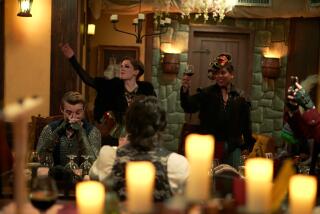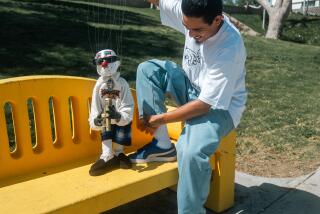A little place of their own
- Share via
MANILA, PHILIPPINES — Every night without fail, Jim Turner is there at the far corner of the bar, chain-smoking his Marlboros and sipping ice-cold San Miguel from the bottle, watching over the Little Ones.
He considers them family, but they’re not his children. They’re the dwarfs and other little people the 70-year-old Iowa native has rescued from the heartless streets of this capital city to offer them friendship and honest work.
For 35 years, the former Peace Corps volunteer has operated the Hobbit House, a bar themed on J.R.R. Tolkien’s fantasy novels, a realm marked by all things miniature.
Under his care, hundreds of dwarfs have adopted new cultural identities. They’re no longer shunned or even feared as supposed evil spirits, but have become popular characters called hobbits -- merry figures who serve drinks, crack ribald jokes and even entertain onstage.
At Turner’s bar, on a dingy block of strip clubs and speak-easies in central Manila, the dwarfs draw a loyal crowd. They’re entertainers who get the joke, always ready to use their small size for a few good-natured laughs.
The Hobbit House features what may be the world’s smallest Elvis impersonator. There have been hobbit jugglers, comics, dancers, flame-eaters and a singer who sounded eerily like Frank Sinatra.
Many of the waiters and bartenders are the grandchildren of the dwarfs who helped Turner launch the bar. There’s now even a second location, at a tourist resort in the central Philippines.
Yet critics have accused Turner of exploiting his workers. Stubbing out a Marlboro, he frowns.
“We took many from the worst slums in Manila, where they were mocked and ridiculed,” he says. “Now they’re no longer carnival freaks. They’re respected entertainers and businesspeople.”
And Turner is their godfather. Workers tell of the night when two drunken Australians began playing catch with terrified little people; Turner stepped between two ruffians nearly twice his size and threw them out of the bar.
He has provided many of his workers with loans and housing and has paid tuitions. Several years ago, he gave them something perhaps even more precious: the Hobbit House itself.
He founded a corporation, naming seven of his employees the main stockholders. Now they make the decisions and call the shots. From his perch at the bar, Turner watches over the business as a consultant and takes only enough salary to pay his bills.
The dwarfs call him tito and kuya, “uncle” and “older brother.”
Pidoy Fetalino, a 35-year veteran of the bar, likes to stroll into business meetings, raise his hand to greet average-sized clients and proudly announce that he’s the establishment’s general manager.
Over drinks after the bar closes, he gets emotional about Turner, who has helped him put two children through college and discover self-respect.
“He’s our protector, a big man with a big heart,” Fetalino says. “One day he said to us: ‘This Hobbit House belongs to all of you. You earned it.’ A lot of us cried that day.”
One afternoon, Turner sits on the street-side patio as colorful jeepneys race past, their horns blaring, seats filled with passengers.
An elderly dwarf limps in with two small men. Naida Morehon retired from the Hobbit House two years ago when her knees gave out. Her husband died last year and she needed money.
As always, Turner took care of things.
“Hi, Naida,” he says, lighting a cigarette. “Did you get the check?”
She hurries to embrace him. Seated, Turner is face to face with Morehon, who places her small hand on his cheek.
“I did, Tito,” she says. “What would we do without you?”
--
A young idealist
Turner arrived in the Philippines in 1961, a young idealist out to change the world. Among the first group of Peace Corps volunteers in the country, he taught English for two years in a rural province, then moved back to Manila.
Slowly, he became consumed by this poor, exotic and often-maddening country. He wanted to stay. After years in Manila, Iowa seemed more like the foreign country.
He did odd jobs, eventually becoming a television station manager. That’s when he was introduced to his first dwarfs.
“We ran a lot of variety shows where we cast midgets, dwarfs and transvestites,” says Turner, a graying man with bushy eyebrows. “They were a staple of TV then.”
In 1972, then-President Ferdinand Marcos declared martial law and shut down the station. Turner needed work, so he and some friends came up with an idea for a theme bar.
He’d read Tolkien’s books as a boy in Cedar Rapids and knew that little people were easy to find in Manila. His first stop was a business called Central Casting, where he hired two dwarfs to work as doormen. Word got out and little people from all over the country began asking for work.
Soon Turner was overrun with little people. They worked as waiters and bartenders and he built them miniature sets of stairs that they climbed to conduct business at the towering wooden bar.
But they soon wanted more: They asked to entertain. So Turner let them have the stage for vaudeville-type acts that featured little people as the big stars. His first performer was a woman named Little Lucy, who ate fire and juggled, balanced on a fulcrum.
“For a while,” Turner recalls, “everyone wanted to be an Elvis impersonator.”
Often, life at the Hobbit House was surreal.
In one act, a dwarf dressed as a security guard patrolled with a Great Dane three times his size. On New Year’s Eve, some of the performers wear diapers and bonnets and carry rattles onstage to become tottering symbols of the infant year.
For a while, after an employee’s uncle closed his pet store, monkeys roamed the bar. There were parrots, turkeys, an eagle and even an alligator. Turner eventually found homes for them too.
During martial law, the bar became the watering hole of the city’s political subversives: anti-Marcos reactionaries, U.S. spies, protesters on the run from the law.
In the mid-1970s, when Francis Ford Coppola filmed “Apocalypse Now” in the Philippines, the Hobbit House was a regular hangout for the director, actors and crew, Turner says, doing his impersonation of Marlon Brando shouting for another drink.
Over the years, he learned that not all of the hobbits were fairy-tale characters. He had to fire some who stole from the till. But Turner quickly recognized the ones he could trust.
They are people like Fetalino. He started as a cashier, but when Turner heard he’d had two years of college, he sent Fetalino for management training. He’s been general manager for 15 years.
“You see the hurdles they scale,” Turner says, “and you realize that no matter how many problems you have, if you’re average size in this world, you’ve got the game half-won.”
--
Life without Jim
The Monday rush is here and the workers at the Hobbit House are ready for action.
But sitting around a table, a few quietly voice a common concern: What would they ever do without the nurturing and guidance of Jim Turner?
Although he swears he’s in perfect health, they know he drinks and smokes too much. A decade ago, when he got sick, a large group of employees went to visit him in the hospital. An exhausted Turner had to tell nurses not to admit any visitor less than 4 feet tall.
Many say it gives them comfort knowing he’s there at his perch, with a green lamp by his side so he can see bills and paperwork in the darkened bar.
But they know he’s getting older and more frail.
Perhaps Waiter Edward Vitto, 33, said it best: “It won’t be the same place without him -- just a bunch of little people with broken hearts.”
--
--
latimes.com/columnone
More Column Ones and a photo gallery on the Hobbit House is available on the Web.
More to Read
Sign up for The Wild
We’ll help you find the best places to hike, bike and run, as well as the perfect silent spots for meditation and yoga.
You may occasionally receive promotional content from the Los Angeles Times.







